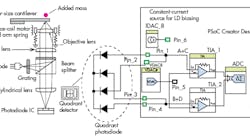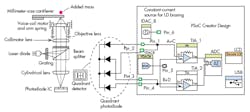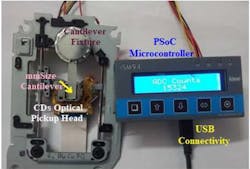Combine Modified CD Optical Assembly, PSoC for High-Resolution Microgram Measurements (.PDF Download)
The ability to measure microgram and milligram masses with extremely high accuracy is often critical in pharmaceutical and chemical industries. This design combines a pickup head from a compact-disc (CD) system and a millimeter-sized cantilever mounted on the CD’s optical pickup head (OPH) to build an alternative, cost-effective microbalance. This simple setup interfaces to a personal computer through a PSoC microcontroller for read out (Fig. 1).
1. The microbalance setup uses a standard CD’s optical pick-up head with an attached millimeter-size cantilever supported with a PSoC embedded design.
Since the CD OPH is designed to measure the variation in the reflecting surface of CD, this design offers resolution of better than 2 μm for the displacement of the added cantilever, which is 25 mm long, 6 mm wide, and 0.43 mm thick (Fig. 2). It offers microgram-scale accuracy at lower cost and with greater sensitivity than microbalances based on the piezoelectric effect.
2. Shown is the CD’s optical pick-up head mounted with millimeter-size cantilever (this is the key element of this mass sensor arrangement) connected with an embedded PSoC design functioning as a microbalance.
In normal CD-player operation, the unit’s OPH laser diode (780 nm) uses a linearly polarizing beam splitter, collimator, objective lens, and anamorphic lens placed in front of the detector array, plus a focusing voice coil and its drive motor. The laser beam is directed to the specimen via the objective lens, which is actuated by the voice-coil motors. The CD surface, in turn, scatters the beam back through the objective lens to the beam splitter, where it’s directed via the anamorphic lens onto the four-quadrant photodiode (QPD).


